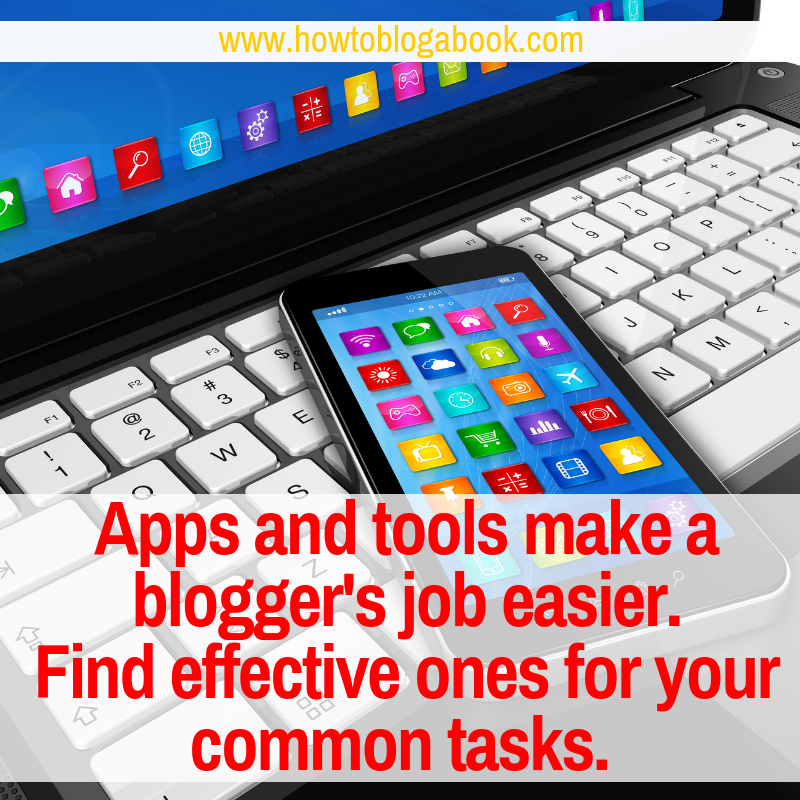A bloggers job can be complicated. There are so many tasks and technology requirements. Authorship isn’t much easier to manage, but you can find ways to become more effective with both writing and blogging. Today, Beth Bauer (@JourneyofBethB) provides a run down of some of the most commonly used apps and tools for both bloggers and authors.
Every profession has its challenges, and useful insider tips can help overcome them. Blogging is no different. As you experience more and more success, efficiency becomes critical. And that’s were apps come in handy.
No one wants to spend hours working on a single 500-word post. If you can accomplish the same thing in less time, and end up having it look like your best work, that’s a bonus! To help you do just that, check out these must-have apps and tools for successful bloggers.
Grammarly
All you have to do is copy and paste your content into Grammarly, and it quickly and easily detects spelling mistakes, grammar issues, problems with punctuation, overused or weak word choices, and even style mistakes, such as using a passive voice. You also can install its free browser extension for Safari, Chrome, Edge, and Firefox. Grammarly’s algorithms flag potential issues in the text and can even check for plagiarism. It clearly explains the reasoning behind each suggested edit, so you can decide for yourself whether to use its suggestions or not.
Hemmingway
Hemmingway highlights overly lengthy, complicated sentences and other common writing errors. It color codes your sentences with yellow highlights to alert you that you need to shorten the sentence. Purple highlights suggest you use a simpler word, and adverbs and weak phrases are exposed using the color blue. If a sentence is highlighted in red, it indicates that your wording is so complicated that your audience probably won’t be able to follow. Unlike Grammarly though, Hemmingway does not always suggest the re-writes, but you can run your mouse over the highlighted areas to receive hints.
Google Calendar
Google Calendar is one the most popular mobile calendar apps, not only because it’s free but because it’s easy to use. It helps you keep track of your own tasks and events and to share your calendars with other people with just a couple of simple clicks. It’s perfect for both business and personal schedules.
If you already have a Google account, then you can access Google Calendar, whether you are aware of it or not. All you need to do is to go to calendar.google.com, or it may already be accessible on your device.
Google Calendar represents everything you’ve come to expect from friends at Google—easy. It’s easy to go to different dates and times on your calendar by just selecting a date. You can also switch between day, week, month, or even year.
Google Docs
Google Docs is a web-based word processor that is easy to access on any device, allowing you to work from anywhere in the world. It also enables you to collaborate with other people in real time. Sharing documents is as easy as a few clicks of the mouse.
Evernote
Evernote is renowned for helping you save and access just about anything, from websites to images and even text messages. You can then access your notes from anywhere with Internet connectivity by using a computer, tablet, or smartphone. Plus, you can easily search through all of your notes so you can find things quickly.
Polldaddy
If you want a fast and simple way to get opinions from your followers, use Polldaddy to create polls and surveys. It’s a nice way to keep an accurate tally without having to sift through all of your comments one by one. PollDaddy also includes a survey editor that is simple to customize.
Dropbox
Dropbox is the definitive tool for syncing up files between computers and mobile devices. There is a Dropbox app for almost every device type and system. If you want to save files to use at a later time, simply add them to Dropbox and voilà!
SEO Blogger
SEO Blogger helps you figure out the most searched keywords for your subject without ever having to leave your blog editing screen. It enables you to research keywords and quickly compare them with other possible keywords.
Flickr
If you don’t have the images you require for a blog post you’ll almost always find them on Flickr. Just search by keyword, and you’ll find tons of great possibilities. Just remember to check licensing copywrites, so you don’t accidentally use someone’s photography without permission.
These tools and apps are some of the best in the business and will surely make your job as a blogger much easier. Check them out, and tell me what you think of them in a comment below. Or, if you have other suggestions, tell me in a comment what they are and why you like the app.
About the Author
 Beth Bauer is a freelance writer, travel blogger, yoga instructor, and entrepreneur currently working on her third novel. She has traveled to over 20 countries in just the last two years and enjoys life as a digital nomad. She is originally from the Pacific Northwest of the U.S.A., and when she’s home lives on the Long Beach Peninsula with her dog, Ozzie.
Beth Bauer is a freelance writer, travel blogger, yoga instructor, and entrepreneur currently working on her third novel. She has traveled to over 20 countries in just the last two years and enjoys life as a digital nomad. She is originally from the Pacific Northwest of the U.S.A., and when she’s home lives on the Long Beach Peninsula with her dog, Ozzie.


I mostly use Grammarly. It is user-friendly and easy to use.
I love Grammarly!
Hey Nina ,,
Thank You so much for share informative Article.
Already i used Hemmingway & Grammarly those tools is very user friendly.
This Article is very helpful for every Blogger..
Hi,
Greate post! i have some of tools like- Grammarly & Flickr.
Thanks for sharing.
I write short stories and use several free grammar programs to check my work. I have been using the free version of Grammarly. I work with the desktop version open, running my story alongside it, pasting into Grammarly and working through all the errors it finds. When that’s done, there is a list of corrections that can only be found in the premium version.